Is it 4, 6, or 12 months?
Which one of the time frames is RIGHT?
How long does it take for SEO to REALLY work?
This article contains the answer. Also, it includes tips to get results from SEO in 3 months.
Let’s dive in…
How Long Does It Take To Start Seeing SEO Results?
For my clients at SERPReach, it takes 3-6 months to see visible results.
Depending on the niche and the budget, the time frame to see significant results can be 9-12 months (or more).
For a more detailed answer, let’s look at the time frame for SEO results from two perspectives:
- Averages for SEOs
- Google’s take
What Are SEOs Saying?
Ahrefs polled the question “how long does SEO take” on LinkedIn. 3972 SEOs answered.
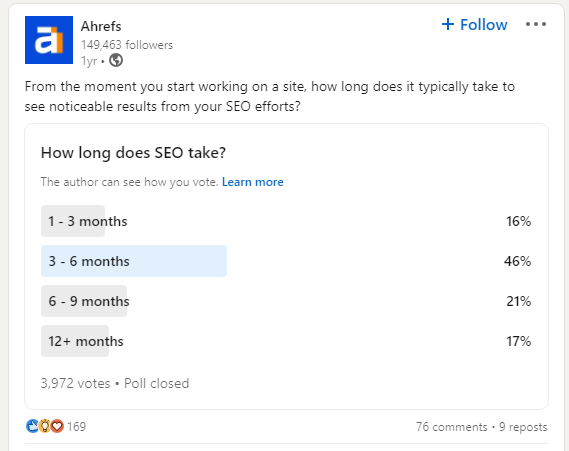
According to the poll, more than two-thirds (67%) SEOs quote the timeline for SEO results as 3-9 months.
One of the respondents, Sid Consulting Inc (on the poll), added a shot to support the poll’s conclusion.
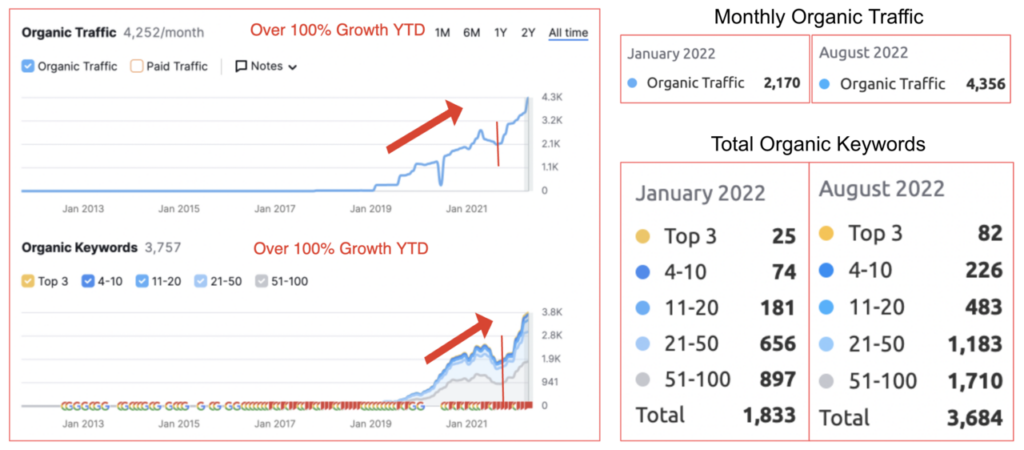
Between January to August 2022 [roughly 8 months]:
- Sid increased monthly traffic x2 — from 2170 to 4356
- Sid increased “ranking organic keywords” in the top 3 positions (on search results) x3 — from 25 to 82
Note: Sid’s site didn’t reach the top 3 on search results in the launch year.
My point:
Not that you won’t see results in your first year. But it is rare.
Only 5.7% of pages rank in the top 10 on search results in their launch year [Ahrefs study of ranking pages for 2M random keywords].
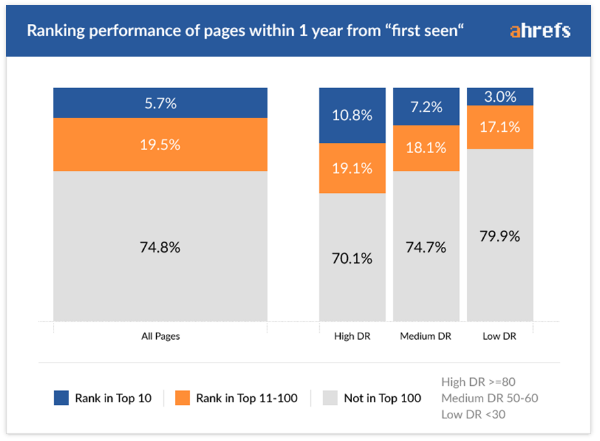
What Is Google Saying?
In one of Google Search Central’s videos [How to hire an SEO] on YouTube, here is the summary of what Maile Ohye said:
SEOs need 4-12 months to first improve a website/business. Then, the benefits will follow.
Can’t watch the entire video on YouTube?
Scroll to 1:46 to hear from the horse’s mouth.
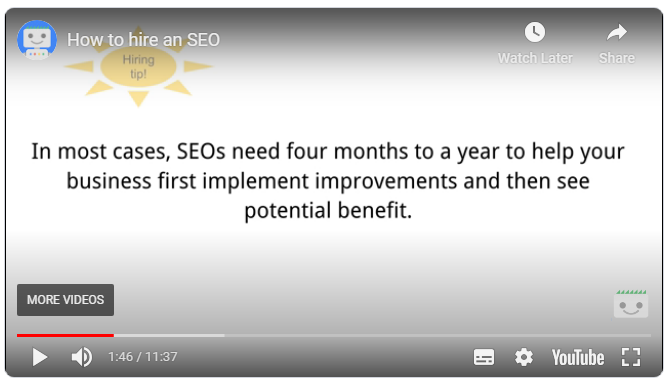
By now, you’re probably wondering why SEO takes so long. What factors determine the time frame?
Let’s find out…
Why Does SEO Take 4-12 Months Before Seeing Results?
The general saying that SEO takes time is 100% true. Unlike SEM (Search Engine Marketing) or PPC (Pay Per Click Advertising), SEO is 100% free. And like other freebies, it requires resources and patience to see results.
However, that is only the overview. There are specific reasons sustainable SEO results take time. Below are the top 5:
- Your website’s age
- Resources
- Strategy & execution
- Competition
- Indexing time
Your Website’s Age
Quick question: who would you trust in this scenario?
Note: the two businesses have excellent products, responsive websites, and top-notch branding.
- Vendor A: has been in business for 5 years and with stellar reviews.
- Vendor B: is a newbie who’s just finding their feet.
The answer is likely vendor A. Why?
You probably trust other buyers’ opinions. Right?
Well, the same principle works on Google Search results. At least, something similar.
Here is what I mean:
Older websites have established topical authority. Readers trust these sites and often come to read their posts; they (readers) even subscribe to the sites’ newsletters.
As a result, older websites tend to have more backlinks from similar authority sites.
In comparison, a new site is a greenhorn. No one knows about it outside the developer, the owner, and a few friends.
The new site must bridge the gap to gain readers’ attention. And unfortunately, that will take time.
For example, imagine your competitor is Forbes.

How long before your new site matches Forbes’ 74M backlinks from 978K websites?
A LONGGG time. And that is if Forbes stops acquiring backlinks.
Resources
The chances are that you can match aged sites even as a newbie. Say the old site already has 100s of posts. You can provide that too.
The same thing applies for backlinks; you can go toe to toe with the big shots.
However, going toe to toe will cost you money. Let’s start with content writing and marketing, for example.
- You will need to produce content in bulk. Maybe ChatGPT (or other AI writers) can help. But you’ll still need a team of writers to edit the articles to match your tone, style and vision.
- Hiring top writers is expensive. And you’ll need several of them.
Pro tip:
Top writers also double as content marketers. They have relationships with target sites for backlinks. That will come in handy.
Outside content, you need SEO tools. The top ones like Ahrefs, Semrush, and Surfer are not exactly cheap.
Having the tools is one thing. You must know how to use them. Otherwise, you’d hire people. That’s more money.
Lastly, your site needs backlinks. And frankly, you might need to pay for some as a newbie.
All these inputs will cost you resources — tons. Then, you can level the playing field.
Note: your enormous resources won’t topple the influences of old sites. But, at the least, you’d have a fighting chance.
Strategy & Execution
Spoiler alert: a juicy SEO budget doesn’t guarantee success. Sorry!
Even with your gigantic resources, you can still fail to rank a single page after a year of implementing SEO if you don’t put a SOLID strategy in place.
Talking about strategy, here are a few questions to ask:
- What are your money keywords?
- What is the difficulty of such keywords? Your answer here will also reveal the level of your competitors.
- Can you afford the resources to beat the competitors for a difficult keyword?
- Should you go all out for a difficult keyword? What if you fail?
My recommendation:
Don’t put all your eggs in a basket. Target difficult, lucrative keywords by all means.
However, be strategic. Here is how I do mine:
- Start with low-volume, easy-to-rank keywords
- Build some organic traffic and backlinks to my site with the momentum
- Afterward, target the “difficult” keywords. But even at this stage, I focus on the super-streamlined ones that will almost end in sales.
Lastly, your strategy will only be as effective as the execution. If you can’t do the latter, get experienced hands who can help.
Competition
Digital marketing generally is competitive. But it is even more so in SEO.
SEOs pitch and compete against each other. And, of course, we have to navigate several algorithm updates too.
So, even with the best budget, it is advisable to pick your battles. For example, say you’re in a niche site business. Avoiding high-level competitive niches, such as casinos & betting, and real estate, is advisable and cost-effective.
But what if such niches are your core business?
Here is what I’ll do in such cases:
Focus my resources on alternative keywords to my “money keyword.”
Here is how to do that:
- Go to Ahrefs > Keywords Explorer > Matching terms report
- Add a filter for KD (Keyword Difficulty) score. I’ll recommend a max of 20.
- Input the keyword into Surfer Content Editor, follow the suggested word count, and aim for a 75 score.
Alternative method:
- Go to Semrush > Keyword Magic Tool > input your keyword
- Change the KD% to “very easy” (0-14%)
- Apply the “related” filter
- Input the keyword into Surfer Content Editor, follow the suggested word count, and aim for a 75 score.
For example, a keyword like “digital marketing” is 100% difficult.
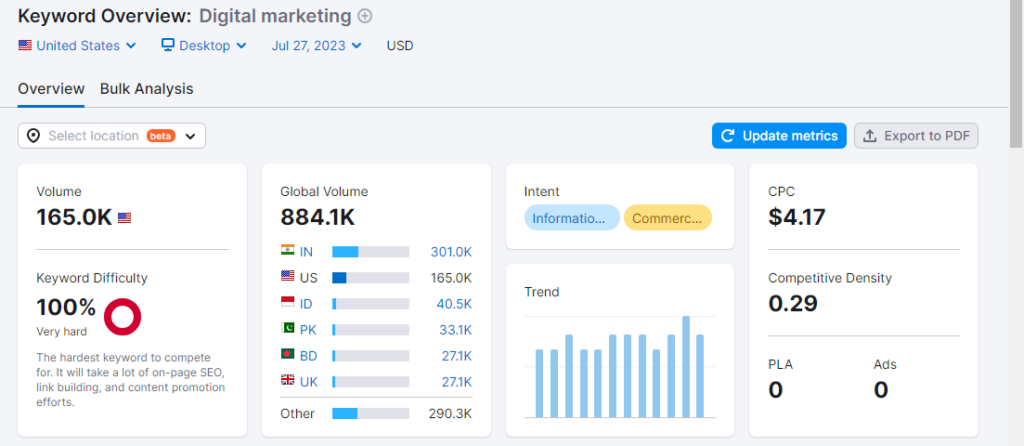
Instead, I’ll use “digital marketing vs digital advertising,” which has a KD of 14%.
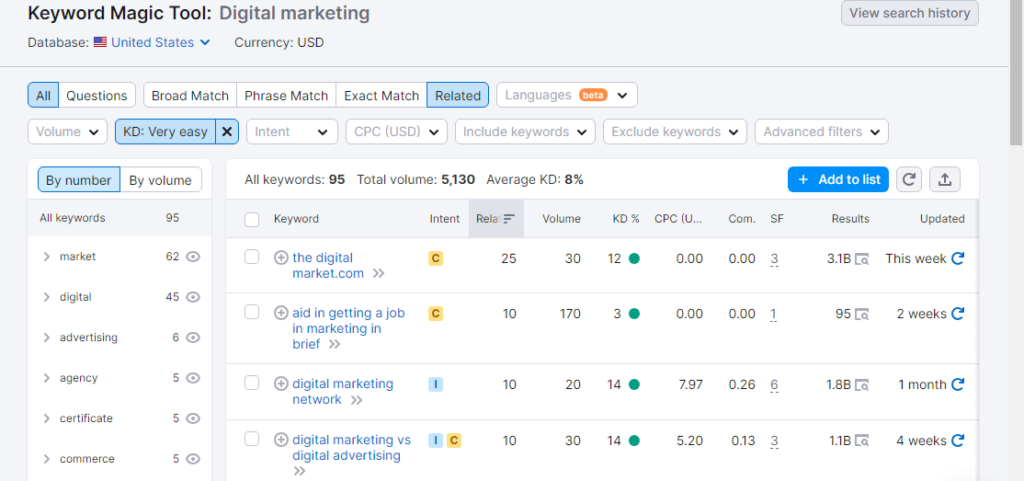
Indexing Time
Google might not know about your content, despite the work done. To avoid such scenarios, ensure you index your pages.
Unfortunately, there is no standard indexing time. However, you can speed up the process by handling a few tasks.
- Upload your sitemap
- Avoid duplicate
- Fix broken links
- Submit your pages for indexing as soon as you publish them
Can You Shorten The Time Frame For SEO Results?
Yes. You can speed up your SEO process and get results like the 5.7% first-year pages on the top 10 SERPs (Search Engine Result Pages).
But first, do you know how to measure SEO success?
Your SEO strategies might be working. And yet, you won’t be in the top 10 on SERPs. Your traffic might be the only visible beneficiary. You might see improvement in sales.
So, before shortening anything, learn the success checklist. That is how to judge if your SEO processes are effective.
How To Know If Your SEO Is Working?
Look out for changes in the 5 metrics below:
Impressions
This metric measures the visibility of your content. It simply reveals if prospects are seeing your articles or ads.
❌️ If this metric is low, work on keyword optimization.
✅️ On the other hand, high impressions means your content is on-point. If this is the case, you are likely in a good position on SERPs.
Clicks & Organic Traffic
Impressions only stop at prospects seeing your posts. They are not clicking it. That is not good enough to make sales.
So, optimize for clicks.
❌️ If this metric is low, revisit your title tags and meta descriptions.
✅️ High click means your CTAs are appealing, and prospects love your content.
Like clicks, organic traffic measures the visitors landing on your website. From experience, this metric gives a more accurate reflection of prospects’ perception of your site.
Here is why:
- Clicks can be from just a device. Plus, it can also be from paid ads.
- Organic traffic, on the other hand, measures the total number of visitors that land on your site. This list is strictly for organic clicks and not advertisements.
❌️ If you have high clicks but low organic traffic, your SEO isn’t doing well.
✅️ High clicks and organic traffic means both SEM and SEO work effectively for your business.
Ranking Pages
Recording high clicks and organic traffic is WONDERFUL. But you still need to know which pages are responsible for that. Hence, the ranking pages.
This way, you can adopt the strategies used for the non-ranking pages. More importantly, you will know from which pages/articles to send link juice to others.
Domain & Page Authority
Naturally, your site and page authority should benefit from your ranking content. How so?
- If you rank high on search results, other sites will notice you and likely link back to your content.
- A ranking content is likely high-quality and features handsome engagement — comments and even social shares.
- The engagement and backlinks will then increase the page authority of the ranking content.
- Being a part of a web of pages, the link juice received from other sites will drip to all interconnected pages. Hence, increased domain authority.
Note:
You can still rank your pages despite low authority. However, create a conscious plan to increase it.
Here is how:
- Backlink profile: check your backlinks from other websites and increase them.
- Branded mentions: claim branded mentions. Use Google Alerts to know when your business is mentioned. Messages the author and get a backlink.
✅️ High number of backlinks & mentions means your SEO is on the right track.
Conversions
This metric measures how users interact with your CTAs. Are they subscribing to your newsletters?
Are users adding your services to their cart? Are they registering an account with your business?
Those questions are what conversion answers. And because of that, it is the ultimate measure of a successful SEO.
If you’re not getting ROI on your SEO budget, your campaigns amount to zero. In other words, conversions are quintessential.
Now, you know the metrics; how can you measure them?
- SEO tools like Ahrefs and Semrush can help
- Google Webmaster Tools like Google Search Console
DIY Tips To Shorten SEO Time Frame
Prioritize 3 key SEO components:
- Technical SEO
- Content
- Backlinks
Technical SEO
- Use responsive designs that offer a seamless experience across all devices
- Optimize your page and site speed
Suggested reading: How Important Is Page Speed For SEO?
- Enable and optimize your XML sitemaps to boost indexability and crawlability
- Use a trusted host and CDN.
Content
- Invest in high-quality content creation.
- Don’t stop at just articles on blogs. Repurpose them for lead gens, newsletters, and socials. Even better, turn the content to videos on YouTube and audio for podcasts.
- Use keywords appropriately and in the right places. Don’t overstuff your content. More importantly, always write to match the searcher’s intent.
Further reading: How To Add Keywords To A Website
- Focus on building topical clusters. This way, you’ll gain topical authority early.
Backlinks
- Create digital assets like reports, tools, and infographics. Others will likely link back to them.
Related reading: How to Create Infographic Links
- Use competitors’ backlink analysis. If a website accepts guest posts from your others, they will readily listen to you.
- Prioritize value first. Genuinely help others, and they will link back to your sites. This is particularly true for broken link building.
- Avoid black hat link building.
- Close all leakages to increase the effectiveness of your link juice. Fix broken pages and enhance your internal link system.
Hire An Expert
The ultimate way to get quick, cost-effective, and sustainable results from SEO is to hire an expert. Leverage experts’ expertise and resources [technical and human] to increase your rankings, traffic, conversions, and sales.
SEO Takes Time. But The Result Is Worth It.
Whether as a DIY project or with an SEO agency, seeing results from SEO takes time. You might not even see the slightest change until 4 months after implementing the changes.
Ultimately, your clicks, traffic, conversions, and sales will increase if you use the best SEO practices.

